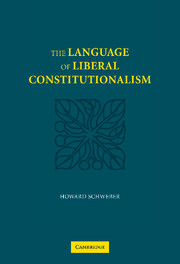Book contents
- Frontmatter
- Contents
- Introduction
- 1 The Search for Sovereignty: Law, Language, and the Beginnings of Modern Constitutionalism
- 2 Consent How? Challenges to Lockean Constitutionalism
- 3 Constitutional Language and the Possibility of Binding Commitments
- 4 Consent to What? Exclusivity and Completeness in Constitutional and Legal Language
- 5 The Question of Substance: Morality, Law, and Constitutional Legitimacy
- 6 The Defense of Constitutional Language
- Bibliography
- Index
5 - The Question of Substance: Morality, Law, and Constitutional Legitimacy
Published online by Cambridge University Press: 17 July 2009
- Frontmatter
- Contents
- Introduction
- 1 The Search for Sovereignty: Law, Language, and the Beginnings of Modern Constitutionalism
- 2 Consent How? Challenges to Lockean Constitutionalism
- 3 Constitutional Language and the Possibility of Binding Commitments
- 4 Consent to What? Exclusivity and Completeness in Constitutional and Legal Language
- 5 The Question of Substance: Morality, Law, and Constitutional Legitimacy
- 6 The Defense of Constitutional Language
- Bibliography
- Index
Summary
This chapter is concerned with the question of substance: Is there a minimum amount of substantive normative commitments that a system of constitutional language is required to have in order to ground a legitimate constitutional regime? As in each of the preceding discussions, the analysis in this chapter breaks down into a series of questions: What are the arguments for including normative substance in a constitutional language, and how do those arguments differ from arguments about the substantive content of “law” generally? What function does normative substance serve for constitutional language? What are the implications of identifying a necessary amount of normative substance for the design and maintenance of a legitimate constitutional regime?
In Chapter 4, an argument that constitutional language should be exclusive and incomplete was developed by engaging theories of law, particularly legal positivism. That analysis led to the recognition that constitutional and legal theories of legitimacy are separate from one another. Those arguments were not silent on the question of substance. Indeed, many of the approaches that were considered in Chapter 4 began from an assumption that the conditions of juridical discourse can, and perhaps should, be described without reference to particular normative content. Despite the inclusiveness of Kelsen's and Hart's appeals to the internal experience of normativity, positivist arguments describe tests for validity rather than tests for correctness; thus they retain the is/ought distinction that separates legal positivism from the substantive tests for legitimacy imposed by older theories of divine or human natural law.
- Type
- Chapter
- Information
- The Language of Liberal Constitutionalism , pp. 260 - 318Publisher: Cambridge University PressPrint publication year: 2007

